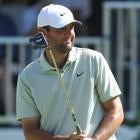
Matt Fitzpatrick is not the first Englishman to beat Jordan Spieth at a golf tournament in the second week of April. However, he's almost certainly the best.
Fitzpatrick took the RBC Heritage with a lights-out 9 iron to legit kick-in distance on the third playoff hole at Harbour Town on Sunday, ending a wild two-week stretch for him that included a top 10 at the Masters and the second win of his PGA Tour career. Following a relatively slow start to 2023 on account of injury, it's a bit of a reorientation to where I thought Fitzpatrick would be at this point in the year. It was the second time in 10 months he's taken down nearly every top player in the world at a massive event. The first, of course, came last June at the U.S. Open at Brookline.
While it sounds crazy to say out loud about someone as unassuming and physically unimposing as Fitzpatrick, it's yet another reason (in a long list of them) why he can, at some point in his career, be the No. 1 golfer in the world.
I floated that idea on Twitter on Sunday, and the reaction was ... interesting. Half of those who responded said, yeah, of course he can. The other half looked at me the way Patrick Cantlay looked at Jordan Spieth after Spieth got up and down from 170 yards for par on Sunday.
In a golf world that includes Jon Rahm, Rory McIlroy, Scottie Scheffler and a handful of other superstars, it does sounds a bit odd that meek Matt Fitzpatrick would ever become the very best of that group. However, here are three reasons it could come to fruition:
1. Pedigree: Fitzpatrick is one of just 46 golfers to have ever been ranked the No. 1 amateur in the world. Others include Rahm, McIlroy, Spieth and Cantlay -- all of whom were just mentioned for their professional achievements. Fitzpatrick won the U.S. Amateur, made two major cuts as an amateur and won a lot. Pedigrees matter, and Fitzpatrick's is extraordinary.
2. Problem solved: The biggest issue Fitzpatrick faced as a professional was his lack of length. When he came onto the pro circuit in 2014, he was short -- too short to truly contend at major championships, evidenced by his one top 10 in his first 23 major starts as a pro. Fitzpatrick has solved this issue with speed training and turned his one hole into a legit strength; he's gained a half-stroke per round off the tee on the average PGA Tour pro for each of the last three seasons. The result? Three top 10s in his last five major stats, including that U.S. Open win.
3. Constant improvement: This driving improvement is emblematic of his overall ethos, which shows that he has consistently gotten better almost every single year for the last decade. Here are his strokes gained since 2011, according to Data Golf ...
| Year | Strokes gained | Improvement |
|---|---|---|
2011 | -2.76 | - |
2012 | -1.69 | 1.07 |
2013 | -1.15 | 0.54 |
2014 | -0.72 | 0.43 |
2015 | 0.07 | 0.79 |
2016 | 0.56 | 0.49 |
2017 | 0.95 | 0.39 |
2018 | 0.87 | -0.08 |
2019 | 1.24 | 0.37 |
2020 | 1.44 | 0.20 |
2021 | 1.36 | -0.08 |
| 2022 | 1.70 | 0.14 |
This is an insane trajectory. There have only been two seasons in the last 11 in which he has gone backwards, and even then the most he's lost from the previous year is a tenth of a stroke per round. That desire to be better than he was the year before is the primary reason Fitzpatrick is going to ascend to the top of the OWGR at some point in his career. There might not be anyone who stays in his own world and does his own thing better than Fitzpatrick.
"For me, the majors are the goals, and winning tournaments like this is obviously also the goal," said Fitzpatrick after the victory at Harbour Town. "For me, after last year it's kind of a thing for me just to play as well as I can each week and just keep working hard on my game to try and improve."
This sums up his outlook on himself and the game as well as anything. And while plenty of pros work on their games constantly, not all of them have unlocked whatever it is that makes you a quarter-stroke or half-stroke better year over year for a decade.
Fitzpatrick has, though, and that -- along with a handful of other factors -- is why the new No. 8 player in the world will reduce that number until, one day, it will no longer be able to be reduced. Then, he can say without hyperbole that he is the best in the world at what he does.





















